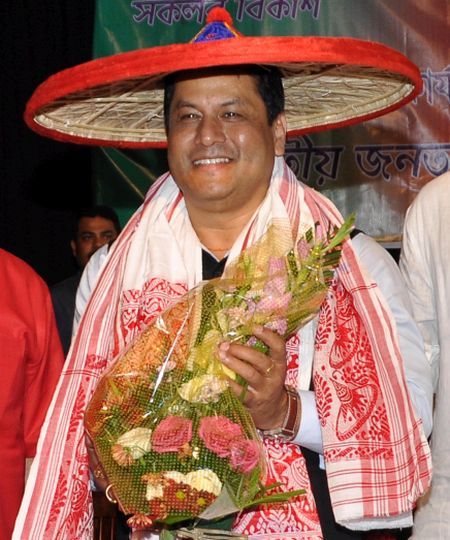'The win in Assam is likely to have a ripple effect in north-eastern states like Manipur and Nagaland which have been reluctant to embrace the BJP in the past,' says Nitin A Gokhale, the distinguished commentator on strategic affairs, who lived and reported from Assam between 1983 and 2006.

The Bharatiya Janata Party, a marginal player in the Assam political scenario until its spectacular showing in the 2014 general election for the Lok Sabha, has truly breached the north-eastern firewall that seemed impenetrable for decades and made a spectacular beginning to what appears to be a start of its rise in smaller neighbouring states of the north-east.
The impact of the BJP's win in Assam goes beyond the north-east too. After the setback in Bihar and its earlier drubbing in Delhi, the BJP needed to win one big state.
Its prospects in West Bengal, Kerala and Tamil Nadu -- states which went to the polls along with Assam -- were dim but it had smelled a whiff of a chance in Assam in 2014 when the party won 7 of the 14 Lok Sabha seats (I wrote on my blog about it here then).
This will give the party a much-needed boost and will re-energise its cadres for the crucial test coming up ahead in Uttar Pradesh in 2017.
The win in Assam is likely to have a ripple effect in other north-eastern states like Manipur and Nagaland which have been reluctant to embrace the BJP in the past despite occasional inroads that the party made in these areas.
Traditionally, smaller north-eastern states have tended to go with the national trend and also imitate election results in Assam.
For example, in the mid- and late 1980s, after the Asom Gana Parishad rose to power, a host of regional parties won in neighbouring north-eastern states, marginalising the Congress party. It will be interesting to see what effect the Congress defeat in Assam has on its governments in Manipur, Meghalaya and Mizoram.
In fact today, three of the six Congress-ruled states are now in the north-east!
Today's outcome also means the end of the road for the affable Tarun Gogoi, one of the last Congress regional satraps who held their own against the Congress high command.
A die-hard Congressman (he was general secretary under Rajiv Gandhi when he joined the party in the early 1980s), Gogoi had a 15-year uninterrupted stint as chief minister after he ousted one-time regional hero Prafulla Mahanta of the AGP in 2001.
That the Narendra Modi-Amit Shah combine read the tea leaves in Assam right is proved in today's result.
Sarbananda Sonowal, pictured, a former student activist-turned-politician -- he was president of the all-powerful All Assam Students Union, AASU -- will become the BJP's first-ever chief minister of Assam, the biggest of the seven north-eastern states.
It was clear in the summer of 2014 that with a bit of planning and smart alliances, the BJP could topple the Congress, after three consecutive tenures in power. A spectacular showing in the local bodies election in early 2015 buoyed the party further.
While the BJP won 39 of the 74 civic bodies, the Congress barely won bag 18. The AGP, a major regional player in the state's politics at one time, too fared dismally, giving the BJP hope that its showing in the 2014 Lok Sabha polls was not a one-off phenomenon.
But it needed a clear strategy. After the Bihar disaster, the BJP leadership quickly did a course correction and declared Sonowal as its chief ministerial candidate, leaving no room for ambiguity. Also, it succeeded in weaning away Himanta Biswa Sarma, a powerful minister in the Tarun Gogoi cabinet.
Miffed at Gogoi's blatant favouritism in promoting his son Gaurav -- now one of the 45 Congress MPs in the Lok Sabha -- by sidelining him, Biswa Sarma switched sides with his supporters in time to bolster the BJP's campaign although many sceptics believed the rebel Congressman would mar the BJP's chances because of his controversial past, including charges of corruption and even alleged links with the insurgent group, the United Liberation Front of Asom, ULFA.
BJP strategists Ram Madhav ensured that Sonowal and Biswa Sarma formed a dependable partnership and delivered results. Sewing up an alliance with the AGP wasn't easy either. A section of the AGP wanted to go it alone, but a more vocal group thought it prudent to go along with the BJP.
That the AGP improved upon its tally from its 2011 showing is evidence enough that the party has benefited from its tie-up with the BJP. The Bodos, who were part of the Tarun Gogoi government for over a decade, also switched sides and bring a dozen MLAs to the BJP's camp.
The big loser in this election, apart from the ruling Congress, is the avowedly Muslim party, the AIUDF, founded and funded by perfume baron Badruddin Ajmal. A rich businessman with an influential presence in central Assam's Muslim-dominated area of Hojai, Ajmal had hoped to become king maker in case there was a hung verdict in the 126-member Assam assembly.
So he refused to tie up with the Congress (of course, both largely depend on votes from Assam's 34 per cent Muslim population) and has paid the price. He himself lost a contest in the Dhubri assembly seat (which has over 80 per cent Muslim voters) even as his party's tally was reduced from 18 to 12 (when reports last came in).
Overall, the BJP should be happy that it has regained momentum in its quest for a Congress-mukht Bharat, but it will have to deliver on two or three basic promises -- controlling infiltration into Assam for one -- it made to the voters.
Strong anti-incumbency with the majority voters' desire to give the BJP a chance has allowed the party to make big inroads in the north-east. The BJP must now build on this base in order to consolidate its expansion in the region.










